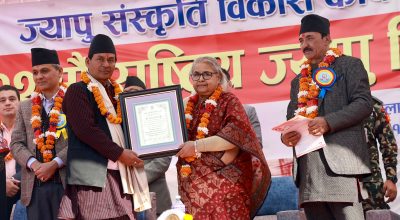
Kathmandu: Given that history of partnership, given our record of achieving results, and not merely words, I admit I am sometimes disappointed by periodic suspicion about U.S. motives I hear from some corners in Nepal. You have seen it most recently in the discussions about our Indo-Pacific Strategy.
We have explained that the Indo-Pacific Strategy is the name we give to U.S. policy. It describes what we Americans strive to do to protect and advance a free, open, and secure Indo-Pacific Region. Some people claim it is a secret military alliance or some kind of member-based organization meant to trap Nepal, though the fact is, as Foreign Minister Gyawali has told Parliament and repeated to the press: Nepal has never been asked to “join” anything.
That’s because there is nothing to join. Look around the region: no one has “joined” the U.S. Indo-Pacific Strategy. Why? Because no one has been asked to join. Much of the current discussion has focused on a single, U.S. Department of Defense report to claim that, since there is a U.S. Department of Defense report, therefore it must be a military strategy. The Indo-Pacific Strategy is simply the name we have given to everything we do in the region, and security is an important part of ensuring the Indo-Pacific Region remains free and open. That is not new. That is how it has been since the end of World War II and since the end of the Cold War. Whether it is multinational missions to fight piracy or more formal bilateral agreements to demonstrate resolve, the fact is that the freedoms we all enjoy depend on security to defend them, and the U.S. security presence in this region has helped provide predictability and security that has allowed the entire region to focus on economic and political development, not fighting wars with each other. So yes, security is one pillar and the U.S. Department of Defense report talks about some of the things they are doing. It is a fancy looking report, and it is one of the first things that comes up if you Google “Indo-Pacific Strategy.” But it is only a single report, and I can bury it under mountains of speeches, press releases, tweets, and congressional briefings that Secretary of State Pompeo has given, and mountains more from other State Department diplomats and USAID officials and others. If you care to look for it, Secretary Pompeo has launched the economic pillar of the Indo-Pacific Strategy and he has launched a governance pillar of the Indo-Pacific Strategy. In early November, the U.S. Secretary of Commerce will host, along with senior officials from the State Department and USAID and private-sector CEOs, an Indo-Pacific Business Forum in Bangkok to highlight the importance of the private sector in the Indo-Pacific Region.
Security is just one part, an important part, but just one part of our pursuing the vision of a free, open, and secure Indo-Pacific Region.
That vision excludes no country. A good number of countries, including some of Nepal’s longstanding friends and partners, have spoken out—of their own volition—in favor of a free, open, and secure Indo-Pacific Region – the very principles that underpin the Indo-Pacific Strategy and have guided our engagement with the region and Nepal for decades, not just for years.
Some individuals claim there is some kind of secret motivation or that it is somehow exclusionary for the United States to call for a free, open, and secure Indo-Pacific Region when, in fact, the U.S. is engaging and promoting the same principles upon which our relationship was founded over 70 years ago. Fundamental freedoms, respect for human rights, inclusive, responsive good governance. To those who question this, I ask: what part of “free, open, and secure” is exclusionary —or counter to anyone’s interests?
Is it exclusionary to call for all countries to respect the sovereignty of others, regardless of size? I certainly don’t think so. I think Nepal, as a small country, has at least as much interest as the United States does in speaking up for the fundamental principle that large countries should not invade small countries and that disputes should be settled peacefully, not through bullying or force.
I don’t understand how is it exclusionary to say that sea lanes and air routes should remain open to all and should not be militarized? All of the countries in the Indo-Pacific region—including China…and India…and Malaysia…and Nepal, everyone—have benefitted from that openness. I think Nepal, as a land-locked country, has at least as much interest as the United States in strengthening the international consensus that sea lanes and air routes should be open.
How can it be exclusionary to say that people should be free, free to exercise their fundamental human freedoms? I think all people, everywhere, are as entitled to enjoy fundamental human freedoms. Nepalis, as a people who have fought for their democracy and their freedoms, have at least as much interest as the United States in speaking up for the principle that human rights violations anywhere are a concern for all of us. Isn’t that why Nepal ratified the Universal Declaration of Human Rights and why Nepal maintains a mission in Geneva and a seat on the UN Human Rights Council?
How can it be anti-anyone to say that refugees deserve protection or that minority groups should not be persecuted? This is a fundamental principle of international law, enshrined in multiple international agreements. Why would saying that it should be upheld be against any country? I think Nepalis know that we all have a responsibility to protect refugees. That is why Nepal generously provided shelter to more than 100,000 Bhutanese refugees, and America’s commitment to that principle is why we took in nearly all of them – our proudest, newest American citizens. Nepal did not do that because Nepal was anti any country, and neither did we.
That’s the point: supporting a free, open, and secure Indo-Pacific is not for or against any country. It is for a set of principles, the same principles that enabled China’s rise and India’s rise and Bangladesh’s rise and Nepal’s rise as well.
That’s the point: supporting a free, open, and secure Indo-Pacific is not for or against any country. It is for a set of principles, the same principles that enabled China’s rise and India’s rise and Bangladesh’s rise and Nepal’s rise as well. Shouldn’t we preserve those principles and ensure that everyone has a chance to benefit from them?
The vision of a free, open, and secure Indo-Pacific seeks to build protections against any country that violates those principles. When we speak out, as we did this week on the margins of the United Nations, about the detention of Uighur Muslims in Xinjiang because of their ethnicity, because of their religion — that’s not anti-China, it is pro-human rights. Just like when we spoke out against Burma’s action that pushed Rohingya Muslims into Bangladesh, India, and Nepal, we were not speaking out because we are anti-Burma, but because we are pro-human rights. Adherence to principles, whether it is the Universal Declaration of Human Rights or any of the other principled agreements, or institutions that Nepal and the United States have pledged ourselves to, adherence to principles means standing up for them, not for or against any particular country.
That’s the thing about principles: they don’t discriminate based on nationality. So whether you’re a hardcore, pro-America capitalist or a hardcore, anti-America Communist doesn’t really make a difference. One thing we should all be able to agree on is the rule-of-law and the importance of maintaining the free, open, and secure Indo-Pacific Region that has prevailed for generations now. We have not asked Nepal to be pro-America, though we welcome the friendship and goodwill! We have not asked Nepal to be against any country. We ask Nepal to be pro-Nepal. We ask Nepal to guard your sovereignty fiercely, including by protecting the principles that protect Nepal, by strengthening the freedom, the openness, and the security that have allowed this region to prosper.
We have not asked Nepal to be pro-America, though we welcome the friendship and goodwill! We have not asked Nepal to be against any country. We ask Nepal to be pro-Nepal.
One last point before I close and listen to your questions and comments. I have told you this is my dream job, but let me share with you a concern. My concern is that, despite the long record of U.S. partnership and the evidence of decades that demonstrates our good faith, our progress and partnership will be harmed, bogged down by suspicion and distracted by misinformation. There are real, consequential decisions to be made and there are commitments to be honored, that have now been complicated by misinformation.
My concern is that, despite the long record of U.S. partnership and the evidence of decades that demonstrates our good faith, our progress and partnership will be harmed, bogged down by suspicion and distracted by misinformation.
Millennium Challenge Corporation (MCC)
The most timely example of an important decision pending is the MCC Compact, which has been in the news recently. The Millennium Challenge Corporation was announced in 2002, with the goal of introducing a new model for international development, with a particular focus on, one, harnessing the power of private sector investment and growth and, two, ensuring that programs had genuine buy-in from the local populations. The MCC has now worked in 50 countries and on every continent.
Let’s be clear on the origins of this extraordinary partnership: Nepal asked the United States to develop an MCC Compact. In keeping with that spirit of local buy-in, of Nepali buy-in, we worked with Nepalis, including the government, private sector, and civil society, to identify what projects would help harness the power of the private sector. For generations, Nepal has talked about developing its renewable hydroelectrical power. A simple fact has stood in the way: you cannot develop a resource like hydropower unless you have a market that will pay for it. That is why the MCC project focuses on constructing the lines that will bring Nepal’s power to the markets where there are consumers ready to pay Nepal good money for it. It is a simple fact of geography and economics that that means India. And hopefully that will include Bangladesh, though, again, a simple fact of geography, if Nepal wants to sell power to Bangladesh, it will require an agreement with India. Some might prefer to find conspiracy hiding behind every door, but sometimes the answer really is just simple geography, simple economics of making this project work, and a discussion based in fact.
I’ve been asked why the MCC compact requires parliament’s ratification? The easy answer is that the MCC requires parliamentary ratification in every country where they operate. This is not a special condition for Nepal.
I’ve been asked why the MCC compact requires parliament’s ratification? The easy answer is that the MCC requires parliamentary ratification in every country where they operate. This is not a special condition for Nepal. But let me flip that question on its head: why is getting parliamentary ratification considered a problem? Remember one of the principles from when MCC was created? Local buy in. The idea was that, rather than having programs designed in foreign capitals and imposed on local populations, MCC would develop projects that the partner country proposed and vetted. And parliament is the representative of the people. Ratification is how we ensure that the Nepali people want us to spend this $500 million in Nepal. Imagine if we did NOT ask for ratification? People would say: why are you forcing this project on us? If we did not ask for ratification, parliamentarians would shout, “but we should have a chance to review it!” And they would be right! Ratification means obviously that this is a sovereign issue, of course, and Nepal’s government is free to chart its own course, and buy-in is critical.
So, MCC is an important decision, but it is not the only one. Let me give you one more example, which is smaller but illustrates the decisions that Nepal has to make.
Military engagement
For decades, for decades, the U.S. military has been engaged with Nepal’s security forces, engaged in the subjects that Nepal’s own security services said they wanted: humanitarian assistance, disaster response, military professionalism, and peacekeeping operations. When the United States military offers to provide training on swift-water rescue in Nepal—how to save people who will drown in a swollen river—some people see a hidden plot. We do this type of programming in more countries than I can count and, again, on every continent, in every region around the world. We are providing what Nepal has asked for, skills to help save Nepali lives! Right now, we are working on something called a State Partnership Program, which is like a sister city program to build Nepal’s relationship with one of our state National Guard programs, the security forces that are often the lead for disaster response in the United States. This is a program that Nepal has told us, across multiple governments, that Nepal wants because it will build Nepal’s capacity. It is the same kind of mutually beneficial partnership that has defined our military relationship from the beginning and that we do all around the world. However, I am concerned that, despite all the consultation we have done, despite our track record over so many decades, this program, too, risks being derailed due to misinformation and suspicion.
If Nepal’s leaders decide they want to say no to U.S. assistance in these areas, that is Nepal’s sovereign decision to make. It will, however, be an abrupt reversal of both the specific requests that the Nepal government has made of us and an abrupt reversal of the spirit of our partnership, the partnership that has benefitted us both. All of us who believe in this partnership, in what it has delivered and what it continues to deliver, would share my disappointment. But we would respect Nepal’s decision, because we respect Nepal’s sovereign right to make these decisions.
I raise these concerns because I worry that we have worked together for many years, in a consultative and transparent manner, to design programs, programs like the MCC and the State Partnership Program, and I am worried that we are seeing that cooperation put at risk. If we want to preserve it, if we want to keep moving ahead, we will need—Nepal’s leaders and Nepal’s people will need—to take deliberate action to do so.
I humbly offer to you my belief that pulling back from Nepal’s partnership with the United States would be a loss for Nepal, for Nepalis, and for the United States as well. I believe it would not be in Nepal’s interest, nor in keeping with Nepal’s historical values, including the principle of amity to all, enmity to none. Diminishing Nepal’s historic partnership with the United States would not make Nepalis more prosperous and it would not make Nepal more secure, more sovereign, or more resilient—those are our goals. The record of our partnership is a record of mutual benefit and mutual trust. I hope, in the end, that our record of mutual benefit and trust will prevail. Misinformation and suspicion damage our ability to deliver real results that the Nepali people deserve. That is the kind of partnership, built on trust, that the United States has always pursued.
I remain hopeful, even confident, that these concerns will prove unfounded. I am, after all, fortunate enough to spend every day doing my dream job. A great American diplomat was once asked whether she was an optimist or a pessimist for the future. Her response: I am an optimist who worries a lot. I have shared with you my worry, but let me reassure you I am an optimist. I have faith that the bedrock of the U.S.-Nepal relationship, which stretches back more than seventy years and is broad and deep today, is strong enough to withstand those who seek to cast doubt and suspicions on it. What Nepalis have seen with their own eyes, what they experienced in their own lives, will mean more than whispered conspiracies. I hope that I can contribute my own part to add to the continuation of our more than seventy years of partnership, to strengthen the foundation to last for the next seventy years!
(Remarks by U.S. Ambassador to Nepal Randy W. Berry at the Institute for Strategic and Socio-Economic Research (ISSR) as delivered on September 27, 2019)
















